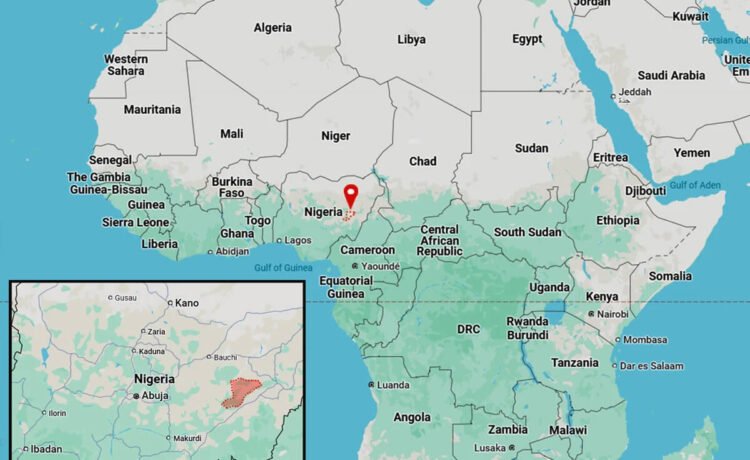NAIROBI, Kenya (RNS) — Violent clashes have broken out between groups of Methodists in Nigeria and Liberia as a divide over the ordination of LGBTQ clergy and same-sex marriage has split the United Methodist Church.
In the eight months since the UMC voted to strike a condemnation of homosexuality from its governing Book of Discipline, tensions have arisen in Africa between dissenting congregations seeking to leave the 56-year-old denomination and those choosing to remain. The fighting between the two factions in Nigeria has left one adult and two children dead.
On Monday (Dec.16), an armed group associated with the Global Methodist Church, a breakaway denomination that rejects LGBTQ acceptance, attacked Bwoi United Methodist Church in Bunkabu, a village in northeastern Nigeria, according to a statement from the bishops of the United Methodist Church in Nigeria. Masoyi Elisha, 27, was shot dead and 10 others were injured.
In addition, 11 homes belonging to the United Methodists were torched, resulting in the deaths of two children, ages 2 and 4, according to the Nigerian UMC bishops. Some houses of members of the Global Methodist Church were burned down in retaliation.
“Today we grieve with the families and the United Methodists of Bunkabu,” said John Schol, an American UMC bishop who is serving as interim lead bishop of the local UMC jurisdiction, and Bishop-elect Ande Emmanuel in a statement. “We offer our condolences to the Kefas family whose small children were killed in the fire and the Filibus family who lost their son,” referring to Elisha’s parents.
The United Methodist bishops said they had warned their Global Methodist counterparts on Nov. 22 that tensions had reached a breaking point. “Yet it fell on deaf ears, and we received no response. We are outraged by this inaction,” said the bishops’ statement, while calling on the Global Methodist Church to end the violence and bring the perpetrators to justice.
According to the bishops, the church will work to restore the homes of Global Methodist families whose homes were set ablaze and it expects the same restitution in kind.
“While lives cannot be brought back, we expect that you will apologize to the families and make restitution to the families whose loved ones were killed,” the bishops said.
The Assembly of Bishops of the Global Methodist Church mourned the loss of life and decried the use of violence, but Global Methodist Bishop John Pena Auta said it was not known who ignited the violence and called on both sides to drop their bitterness and embrace peace.
“Bishop John Pena equally was saddened by the news of the impasse which erupted between the two factions in the area, advising the warring community to eschew all bitterness and embrace peace,” said Ezekiel Ibrahim Maisamari, director of communications at the Global Methodist Church Nigeria, in a statement.
Efforts to reach the two factions in Nigeria have been unsuccessful, but the conflict in Nigeria is said to have erupted over control of church property and resources, including foreign donations, after the split with the U.S church.
In April of this year, after decades of internal debate over the status of LGBTQ members of the UMC, its General Conference, meeting in Charlotte, North Carolina, removed language from the Book of Discipline banning LGBTQ clergy and restricting same-sex marriages, and at the same time voted to restructure the worldwide denomination into four regions — Africa, Europe, the Philippines and the United States — each of which could customize the Book of Discipline according to local needs and beliefs.

Members of the United Methodist Church in Zimbabwe hold placards while protesting at the church premises in Harare, May 30, 2024. The protests, which denounced homosexuality and the departure of the church from the Scriptures and doctrine, came barely a month after the United Methodist Church worldwide General Conference, held in North Carolina, repealed the church’s long-standing ban on LGBTQ clergy, removing a rule forbidding “self-avowed practicing homosexuals” from being ordained or appointed as ministers. (AP Photo/Tsvangirayi Mukwazhi)
Two years earlier, conservative United Methodists had begun to break from the denomination to form the Global Methodist Church, which rejects the changes to the Book of Discipline. Since then, more than a quarter of the churches in the United States have either joined the GMC or formed their own local networks or become independent.
On May 28, Bishop Benjamin Boni, presiding bishop of the Annual Conference of the UMC in Ivory Coast, announced the church’s departure from the UMC. With 1.2 million members, the Ivorian church represented one of the largest bodies of United Methodists outside the U.S.
In Liberia, disputes have been growing in the 150,000-member church, with some clergy and lay members pushing for a special session of the country’s annual conference to make a decision on the U.S. church decision.
But Bishop Samuel Jerome Quire, the resident bishop of the Liberia area, has refused, stressing the importance of maintaining unity in the church. The bishop has responded by suspending some clerics and church elders.
In July, the Nigerian church opted for a split, with Bishop John Wesley Yohanna leaving the UMC to join the Global Methodist Church, taking with him his large church of some 600,000 members, though some reports put the membership at 1 million.















